NR512 Week 5: Electronic Health Record Impact on Nursing
VerifiedAdded on 2023/01/20
|7
|2018
|86
Report
AI Summary
This report analyzes the impact of Electronic Health Records (EHR) on nursing practice, focusing on its benefits and drawbacks. The paper begins with a rationale for choosing EHR as a topic, emphasizing its relevance to Family Nurse Practitioners and its growing importance in healthcare. It then explores the pros, such as time-saving documentation and improved patient care, and cons, including potential for increased stress and the need for IT competency. The use of informatics skills and knowledge in developing the report is highlighted, emphasizing the need for basic informatics skills for nurses. The report concludes with recommendations for future improvements, including incorporating informatics into nursing education to enhance nurses' skills and improve patient outcomes. The author emphasizes the importance of further research to reduce burdens associated with EHR use and achieve better healthcare outcomes.
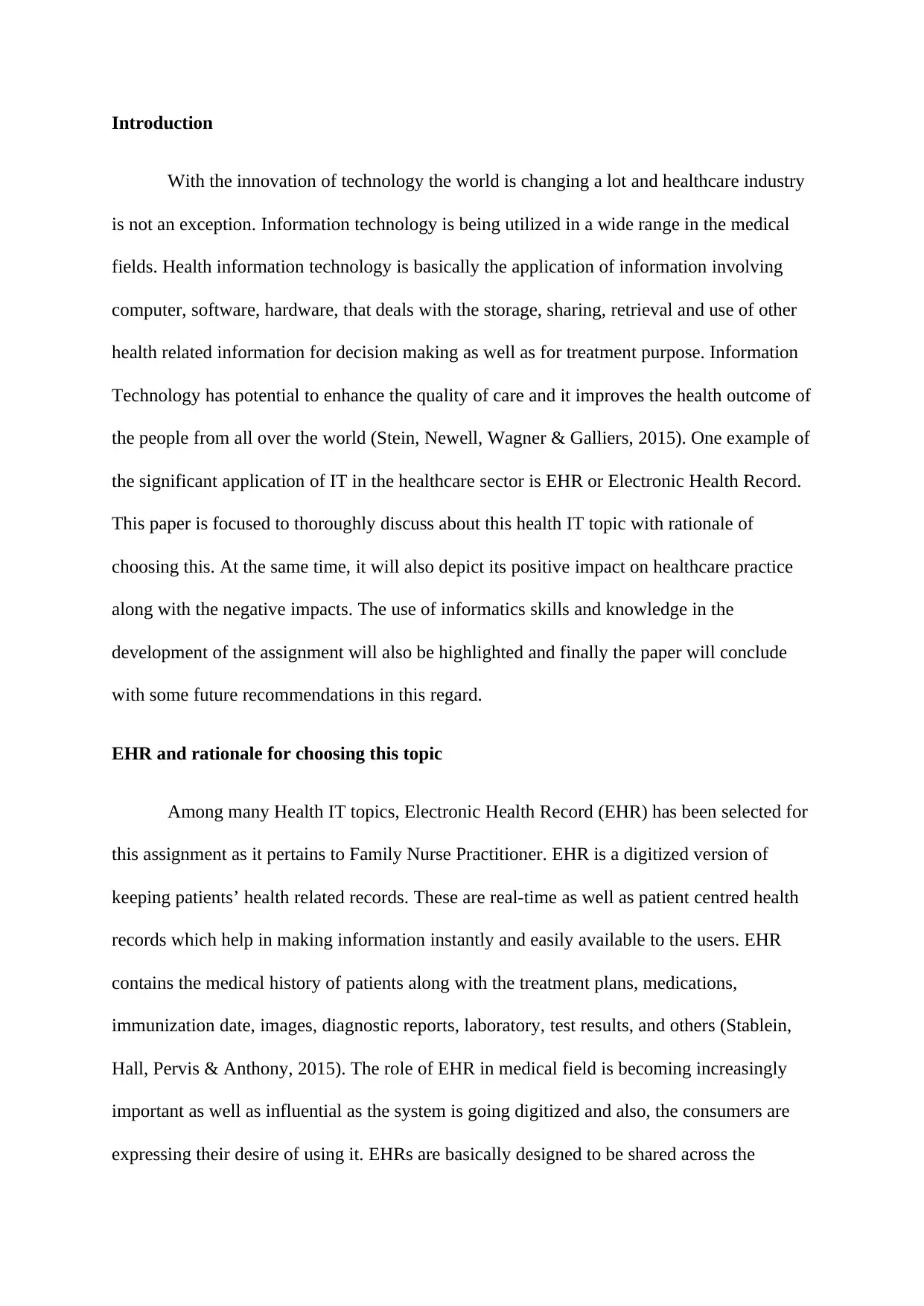
Introduction
With the innovation of technology the world is changing a lot and healthcare industry
is not an exception. Information technology is being utilized in a wide range in the medical
fields. Health information technology is basically the application of information involving
computer, software, hardware, that deals with the storage, sharing, retrieval and use of other
health related information for decision making as well as for treatment purpose. Information
Technology has potential to enhance the quality of care and it improves the health outcome of
the people from all over the world (Stein, Newell, Wagner & Galliers, 2015). One example of
the significant application of IT in the healthcare sector is EHR or Electronic Health Record.
This paper is focused to thoroughly discuss about this health IT topic with rationale of
choosing this. At the same time, it will also depict its positive impact on healthcare practice
along with the negative impacts. The use of informatics skills and knowledge in the
development of the assignment will also be highlighted and finally the paper will conclude
with some future recommendations in this regard.
EHR and rationale for choosing this topic
Among many Health IT topics, Electronic Health Record (EHR) has been selected for
this assignment as it pertains to Family Nurse Practitioner. EHR is a digitized version of
keeping patients’ health related records. These are real-time as well as patient centred health
records which help in making information instantly and easily available to the users. EHR
contains the medical history of patients along with the treatment plans, medications,
immunization date, images, diagnostic reports, laboratory, test results, and others (Stablein,
Hall, Pervis & Anthony, 2015). The role of EHR in medical field is becoming increasingly
important as well as influential as the system is going digitized and also, the consumers are
expressing their desire of using it. EHRs are basically designed to be shared across the
With the innovation of technology the world is changing a lot and healthcare industry
is not an exception. Information technology is being utilized in a wide range in the medical
fields. Health information technology is basically the application of information involving
computer, software, hardware, that deals with the storage, sharing, retrieval and use of other
health related information for decision making as well as for treatment purpose. Information
Technology has potential to enhance the quality of care and it improves the health outcome of
the people from all over the world (Stein, Newell, Wagner & Galliers, 2015). One example of
the significant application of IT in the healthcare sector is EHR or Electronic Health Record.
This paper is focused to thoroughly discuss about this health IT topic with rationale of
choosing this. At the same time, it will also depict its positive impact on healthcare practice
along with the negative impacts. The use of informatics skills and knowledge in the
development of the assignment will also be highlighted and finally the paper will conclude
with some future recommendations in this regard.
EHR and rationale for choosing this topic
Among many Health IT topics, Electronic Health Record (EHR) has been selected for
this assignment as it pertains to Family Nurse Practitioner. EHR is a digitized version of
keeping patients’ health related records. These are real-time as well as patient centred health
records which help in making information instantly and easily available to the users. EHR
contains the medical history of patients along with the treatment plans, medications,
immunization date, images, diagnostic reports, laboratory, test results, and others (Stablein,
Hall, Pervis & Anthony, 2015). The role of EHR in medical field is becoming increasingly
important as well as influential as the system is going digitized and also, the consumers are
expressing their desire of using it. EHRs are basically designed to be shared across the
Paraphrase This Document
Need a fresh take? Get an instant paraphrase of this document with our AI Paraphraser
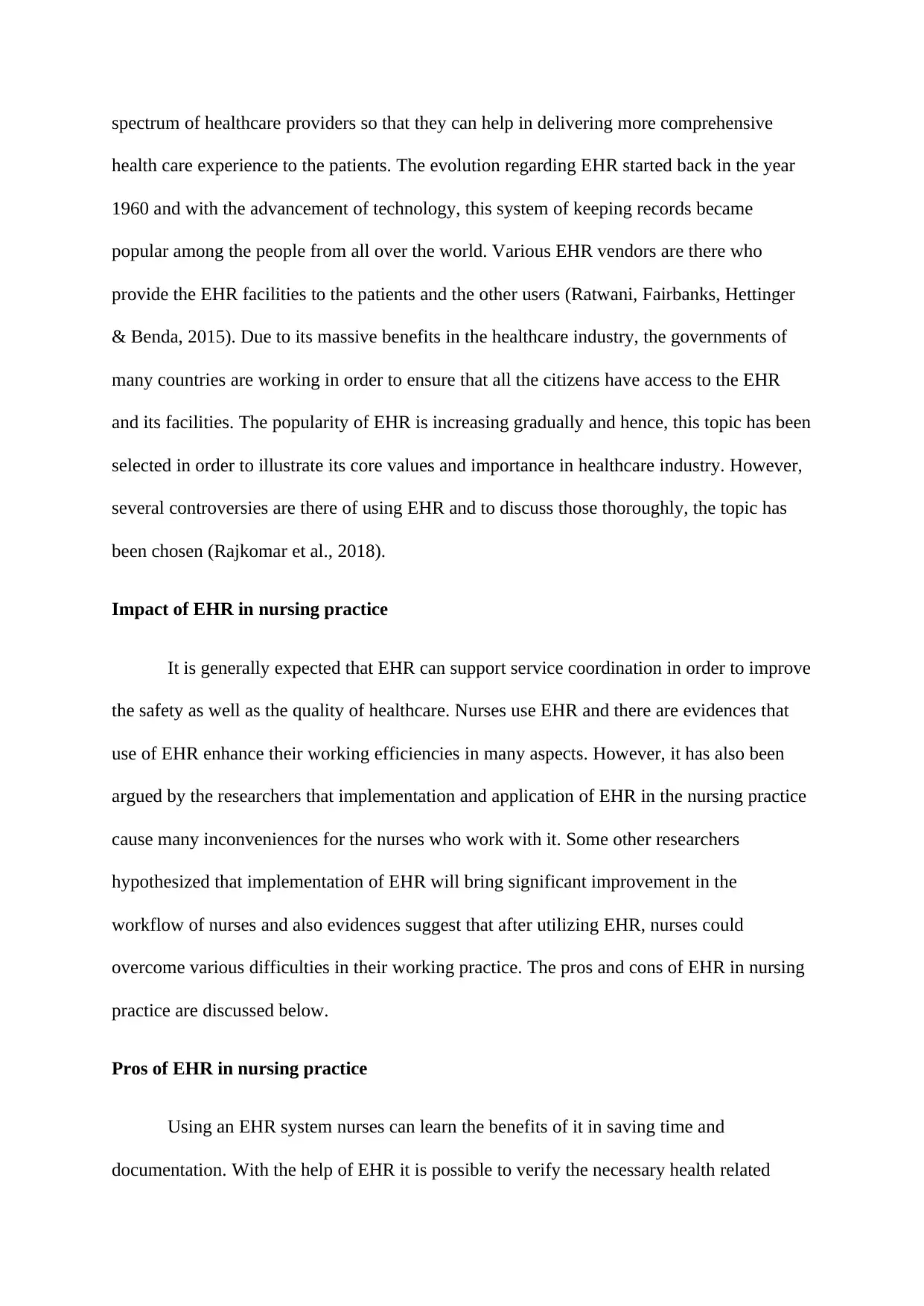
spectrum of healthcare providers so that they can help in delivering more comprehensive
health care experience to the patients. The evolution regarding EHR started back in the year
1960 and with the advancement of technology, this system of keeping records became
popular among the people from all over the world. Various EHR vendors are there who
provide the EHR facilities to the patients and the other users (Ratwani, Fairbanks, Hettinger
& Benda, 2015). Due to its massive benefits in the healthcare industry, the governments of
many countries are working in order to ensure that all the citizens have access to the EHR
and its facilities. The popularity of EHR is increasing gradually and hence, this topic has been
selected in order to illustrate its core values and importance in healthcare industry. However,
several controversies are there of using EHR and to discuss those thoroughly, the topic has
been chosen (Rajkomar et al., 2018).
Impact of EHR in nursing practice
It is generally expected that EHR can support service coordination in order to improve
the safety as well as the quality of healthcare. Nurses use EHR and there are evidences that
use of EHR enhance their working efficiencies in many aspects. However, it has also been
argued by the researchers that implementation and application of EHR in the nursing practice
cause many inconveniences for the nurses who work with it. Some other researchers
hypothesized that implementation of EHR will bring significant improvement in the
workflow of nurses and also evidences suggest that after utilizing EHR, nurses could
overcome various difficulties in their working practice. The pros and cons of EHR in nursing
practice are discussed below.
Pros of EHR in nursing practice
Using an EHR system nurses can learn the benefits of it in saving time and
documentation. With the help of EHR it is possible to verify the necessary health related
health care experience to the patients. The evolution regarding EHR started back in the year
1960 and with the advancement of technology, this system of keeping records became
popular among the people from all over the world. Various EHR vendors are there who
provide the EHR facilities to the patients and the other users (Ratwani, Fairbanks, Hettinger
& Benda, 2015). Due to its massive benefits in the healthcare industry, the governments of
many countries are working in order to ensure that all the citizens have access to the EHR
and its facilities. The popularity of EHR is increasing gradually and hence, this topic has been
selected in order to illustrate its core values and importance in healthcare industry. However,
several controversies are there of using EHR and to discuss those thoroughly, the topic has
been chosen (Rajkomar et al., 2018).
Impact of EHR in nursing practice
It is generally expected that EHR can support service coordination in order to improve
the safety as well as the quality of healthcare. Nurses use EHR and there are evidences that
use of EHR enhance their working efficiencies in many aspects. However, it has also been
argued by the researchers that implementation and application of EHR in the nursing practice
cause many inconveniences for the nurses who work with it. Some other researchers
hypothesized that implementation of EHR will bring significant improvement in the
workflow of nurses and also evidences suggest that after utilizing EHR, nurses could
overcome various difficulties in their working practice. The pros and cons of EHR in nursing
practice are discussed below.
Pros of EHR in nursing practice
Using an EHR system nurses can learn the benefits of it in saving time and
documentation. With the help of EHR it is possible to verify the necessary health related
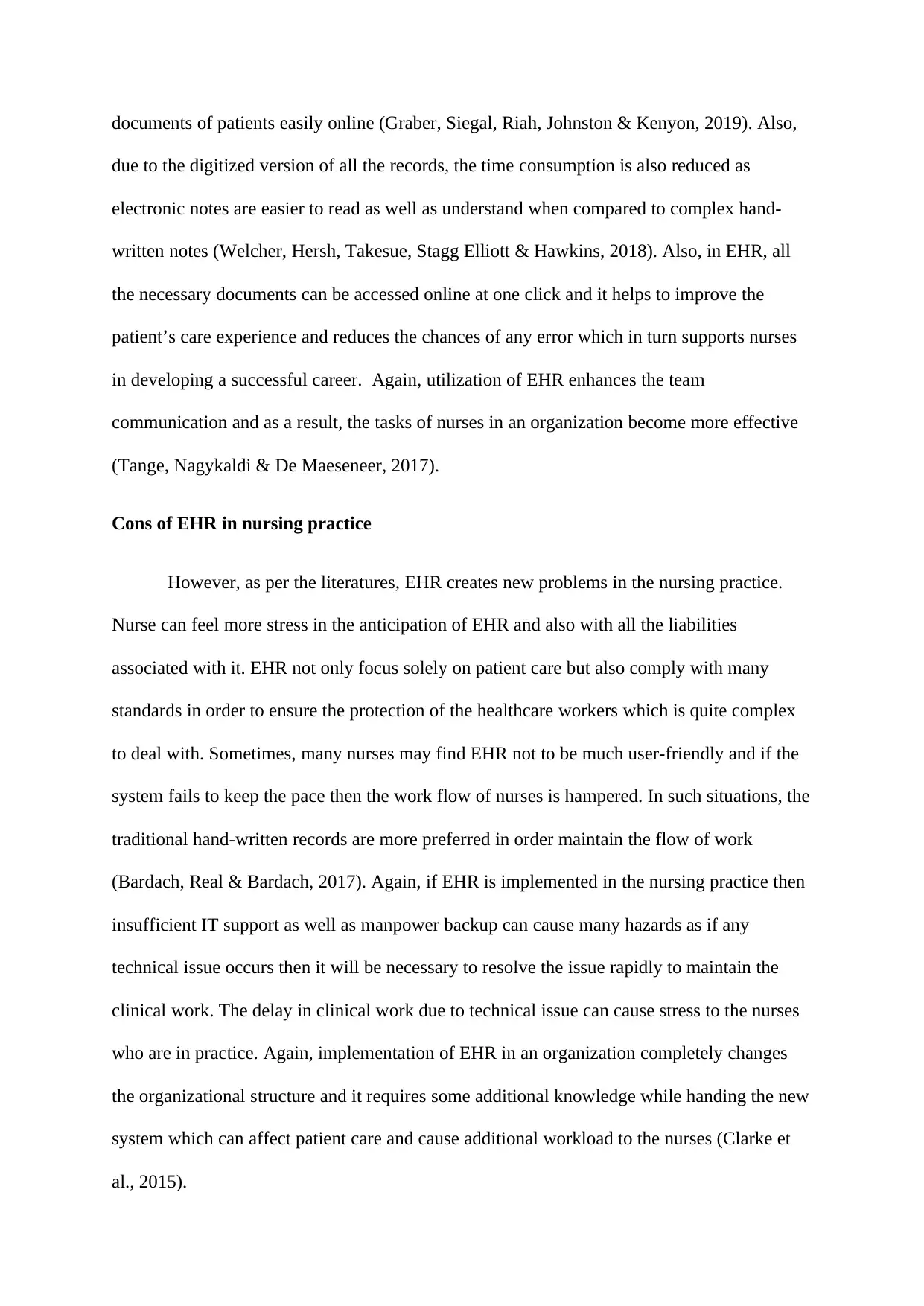
documents of patients easily online (Graber, Siegal, Riah, Johnston & Kenyon, 2019). Also,
due to the digitized version of all the records, the time consumption is also reduced as
electronic notes are easier to read as well as understand when compared to complex hand-
written notes (Welcher, Hersh, Takesue, Stagg Elliott & Hawkins, 2018). Also, in EHR, all
the necessary documents can be accessed online at one click and it helps to improve the
patient’s care experience and reduces the chances of any error which in turn supports nurses
in developing a successful career. Again, utilization of EHR enhances the team
communication and as a result, the tasks of nurses in an organization become more effective
(Tange, Nagykaldi & De Maeseneer, 2017).
Cons of EHR in nursing practice
However, as per the literatures, EHR creates new problems in the nursing practice.
Nurse can feel more stress in the anticipation of EHR and also with all the liabilities
associated with it. EHR not only focus solely on patient care but also comply with many
standards in order to ensure the protection of the healthcare workers which is quite complex
to deal with. Sometimes, many nurses may find EHR not to be much user-friendly and if the
system fails to keep the pace then the work flow of nurses is hampered. In such situations, the
traditional hand-written records are more preferred in order maintain the flow of work
(Bardach, Real & Bardach, 2017). Again, if EHR is implemented in the nursing practice then
insufficient IT support as well as manpower backup can cause many hazards as if any
technical issue occurs then it will be necessary to resolve the issue rapidly to maintain the
clinical work. The delay in clinical work due to technical issue can cause stress to the nurses
who are in practice. Again, implementation of EHR in an organization completely changes
the organizational structure and it requires some additional knowledge while handing the new
system which can affect patient care and cause additional workload to the nurses (Clarke et
al., 2015).
due to the digitized version of all the records, the time consumption is also reduced as
electronic notes are easier to read as well as understand when compared to complex hand-
written notes (Welcher, Hersh, Takesue, Stagg Elliott & Hawkins, 2018). Also, in EHR, all
the necessary documents can be accessed online at one click and it helps to improve the
patient’s care experience and reduces the chances of any error which in turn supports nurses
in developing a successful career. Again, utilization of EHR enhances the team
communication and as a result, the tasks of nurses in an organization become more effective
(Tange, Nagykaldi & De Maeseneer, 2017).
Cons of EHR in nursing practice
However, as per the literatures, EHR creates new problems in the nursing practice.
Nurse can feel more stress in the anticipation of EHR and also with all the liabilities
associated with it. EHR not only focus solely on patient care but also comply with many
standards in order to ensure the protection of the healthcare workers which is quite complex
to deal with. Sometimes, many nurses may find EHR not to be much user-friendly and if the
system fails to keep the pace then the work flow of nurses is hampered. In such situations, the
traditional hand-written records are more preferred in order maintain the flow of work
(Bardach, Real & Bardach, 2017). Again, if EHR is implemented in the nursing practice then
insufficient IT support as well as manpower backup can cause many hazards as if any
technical issue occurs then it will be necessary to resolve the issue rapidly to maintain the
clinical work. The delay in clinical work due to technical issue can cause stress to the nurses
who are in practice. Again, implementation of EHR in an organization completely changes
the organizational structure and it requires some additional knowledge while handing the new
system which can affect patient care and cause additional workload to the nurses (Clarke et
al., 2015).
⊘ This is a preview!⊘
Do you want full access?
Subscribe today to unlock all pages.

Trusted by 1+ million students worldwide
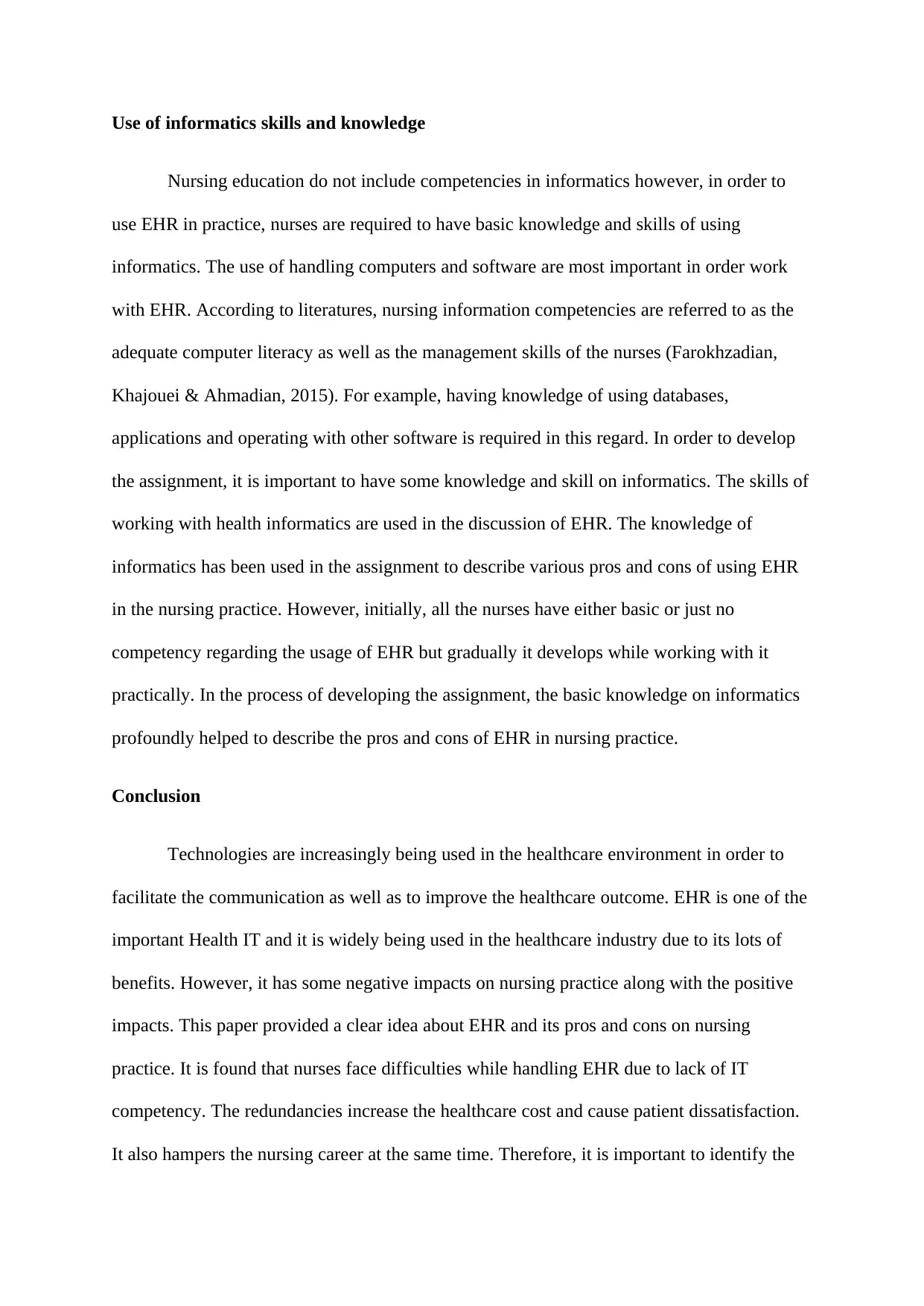
Use of informatics skills and knowledge
Nursing education do not include competencies in informatics however, in order to
use EHR in practice, nurses are required to have basic knowledge and skills of using
informatics. The use of handling computers and software are most important in order work
with EHR. According to literatures, nursing information competencies are referred to as the
adequate computer literacy as well as the management skills of the nurses (Farokhzadian,
Khajouei & Ahmadian, 2015). For example, having knowledge of using databases,
applications and operating with other software is required in this regard. In order to develop
the assignment, it is important to have some knowledge and skill on informatics. The skills of
working with health informatics are used in the discussion of EHR. The knowledge of
informatics has been used in the assignment to describe various pros and cons of using EHR
in the nursing practice. However, initially, all the nurses have either basic or just no
competency regarding the usage of EHR but gradually it develops while working with it
practically. In the process of developing the assignment, the basic knowledge on informatics
profoundly helped to describe the pros and cons of EHR in nursing practice.
Conclusion
Technologies are increasingly being used in the healthcare environment in order to
facilitate the communication as well as to improve the healthcare outcome. EHR is one of the
important Health IT and it is widely being used in the healthcare industry due to its lots of
benefits. However, it has some negative impacts on nursing practice along with the positive
impacts. This paper provided a clear idea about EHR and its pros and cons on nursing
practice. It is found that nurses face difficulties while handling EHR due to lack of IT
competency. The redundancies increase the healthcare cost and cause patient dissatisfaction.
It also hampers the nursing career at the same time. Therefore, it is important to identify the
Nursing education do not include competencies in informatics however, in order to
use EHR in practice, nurses are required to have basic knowledge and skills of using
informatics. The use of handling computers and software are most important in order work
with EHR. According to literatures, nursing information competencies are referred to as the
adequate computer literacy as well as the management skills of the nurses (Farokhzadian,
Khajouei & Ahmadian, 2015). For example, having knowledge of using databases,
applications and operating with other software is required in this regard. In order to develop
the assignment, it is important to have some knowledge and skill on informatics. The skills of
working with health informatics are used in the discussion of EHR. The knowledge of
informatics has been used in the assignment to describe various pros and cons of using EHR
in the nursing practice. However, initially, all the nurses have either basic or just no
competency regarding the usage of EHR but gradually it develops while working with it
practically. In the process of developing the assignment, the basic knowledge on informatics
profoundly helped to describe the pros and cons of EHR in nursing practice.
Conclusion
Technologies are increasingly being used in the healthcare environment in order to
facilitate the communication as well as to improve the healthcare outcome. EHR is one of the
important Health IT and it is widely being used in the healthcare industry due to its lots of
benefits. However, it has some negative impacts on nursing practice along with the positive
impacts. This paper provided a clear idea about EHR and its pros and cons on nursing
practice. It is found that nurses face difficulties while handling EHR due to lack of IT
competency. The redundancies increase the healthcare cost and cause patient dissatisfaction.
It also hampers the nursing career at the same time. Therefore, it is important to identify the
Paraphrase This Document
Need a fresh take? Get an instant paraphrase of this document with our AI Paraphraser
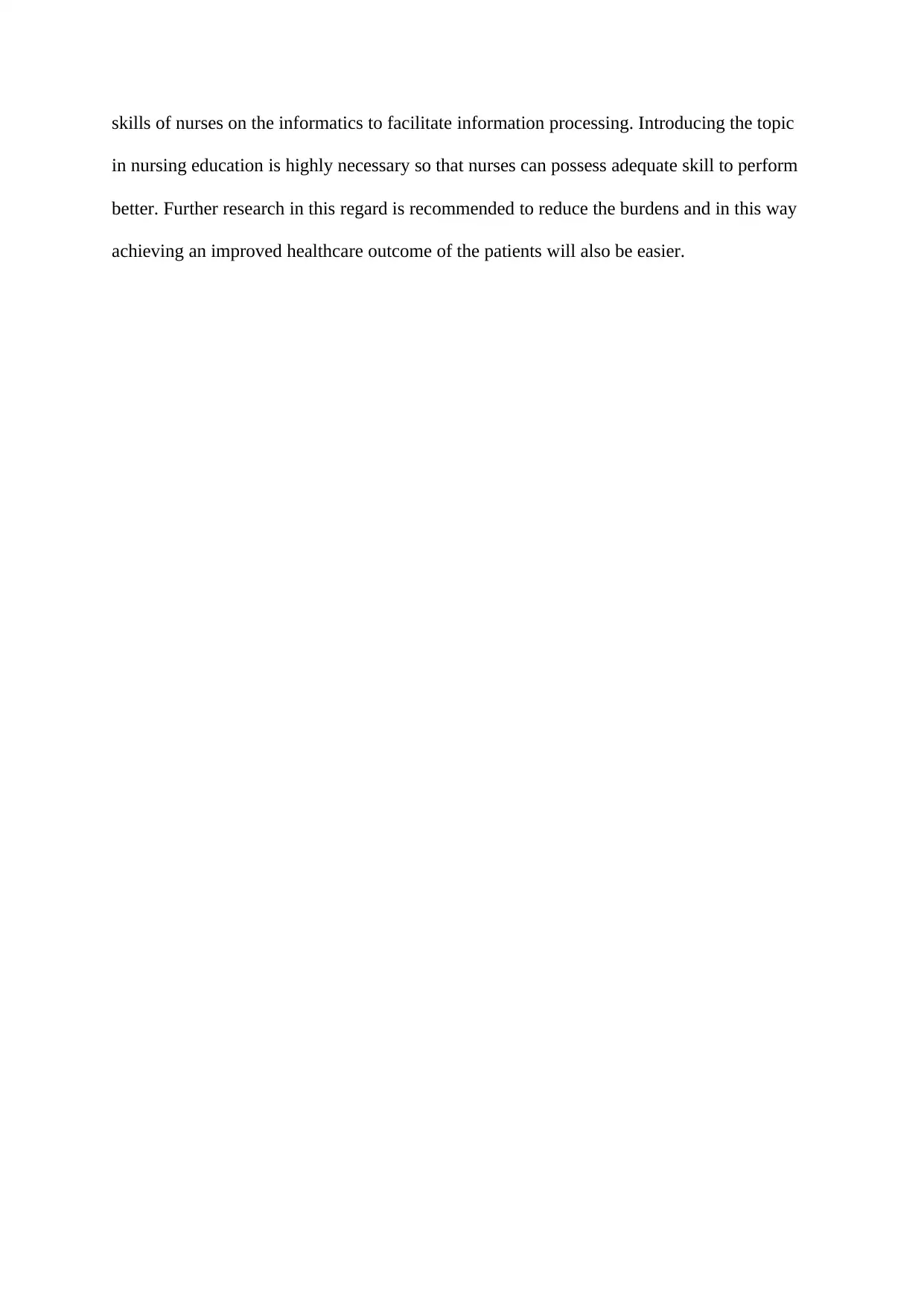
skills of nurses on the informatics to facilitate information processing. Introducing the topic
in nursing education is highly necessary so that nurses can possess adequate skill to perform
better. Further research in this regard is recommended to reduce the burdens and in this way
achieving an improved healthcare outcome of the patients will also be easier.
in nursing education is highly necessary so that nurses can possess adequate skill to perform
better. Further research in this regard is recommended to reduce the burdens and in this way
achieving an improved healthcare outcome of the patients will also be easier.
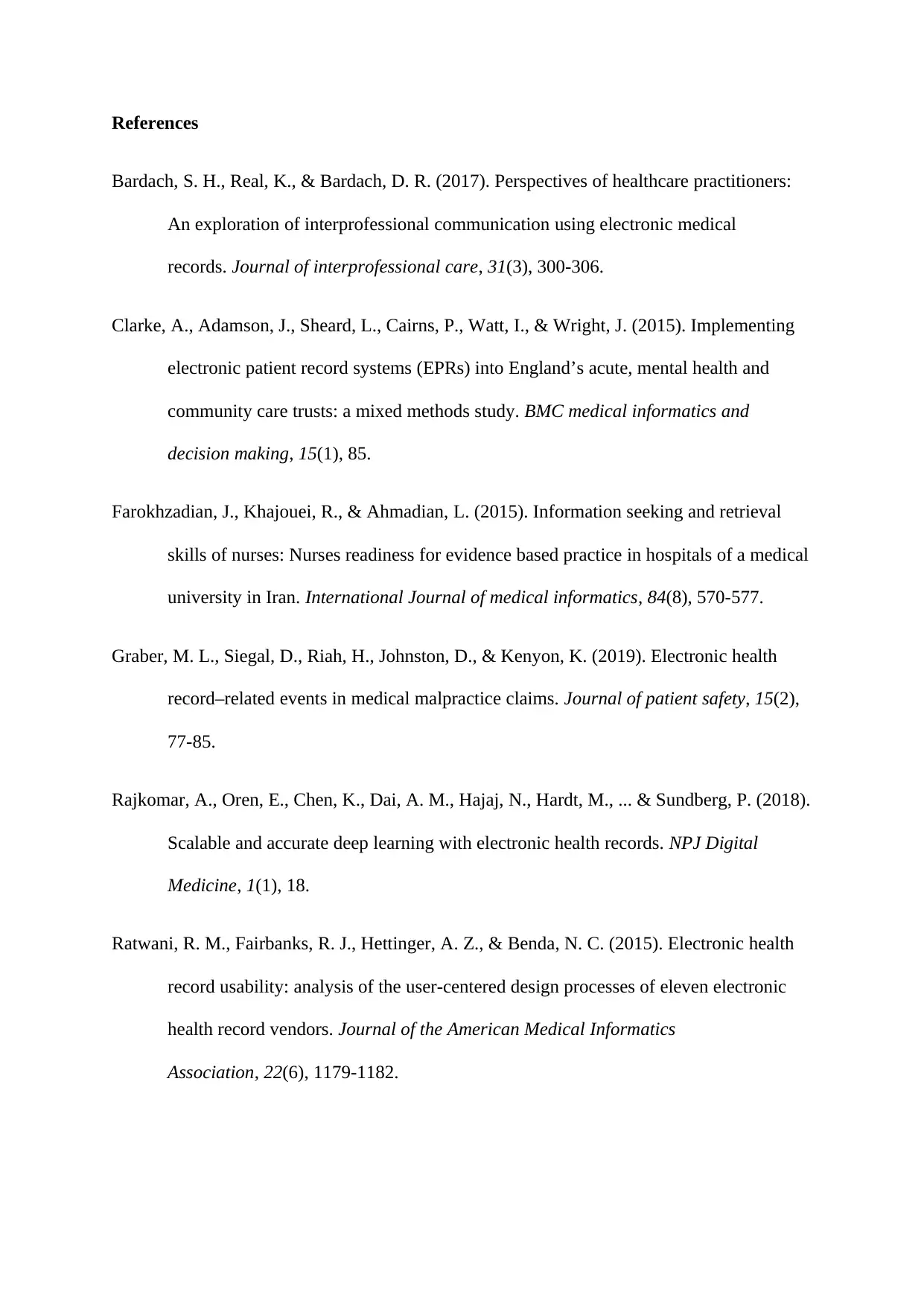
References
Bardach, S. H., Real, K., & Bardach, D. R. (2017). Perspectives of healthcare practitioners:
An exploration of interprofessional communication using electronic medical
records. Journal of interprofessional care, 31(3), 300-306.
Clarke, A., Adamson, J., Sheard, L., Cairns, P., Watt, I., & Wright, J. (2015). Implementing
electronic patient record systems (EPRs) into England’s acute, mental health and
community care trusts: a mixed methods study. BMC medical informatics and
decision making, 15(1), 85.
Farokhzadian, J., Khajouei, R., & Ahmadian, L. (2015). Information seeking and retrieval
skills of nurses: Nurses readiness for evidence based practice in hospitals of a medical
university in Iran. International Journal of medical informatics, 84(8), 570-577.
Graber, M. L., Siegal, D., Riah, H., Johnston, D., & Kenyon, K. (2019). Electronic health
record–related events in medical malpractice claims. Journal of patient safety, 15(2),
77-85.
Rajkomar, A., Oren, E., Chen, K., Dai, A. M., Hajaj, N., Hardt, M., ... & Sundberg, P. (2018).
Scalable and accurate deep learning with electronic health records. NPJ Digital
Medicine, 1(1), 18.
Ratwani, R. M., Fairbanks, R. J., Hettinger, A. Z., & Benda, N. C. (2015). Electronic health
record usability: analysis of the user-centered design processes of eleven electronic
health record vendors. Journal of the American Medical Informatics
Association, 22(6), 1179-1182.
Bardach, S. H., Real, K., & Bardach, D. R. (2017). Perspectives of healthcare practitioners:
An exploration of interprofessional communication using electronic medical
records. Journal of interprofessional care, 31(3), 300-306.
Clarke, A., Adamson, J., Sheard, L., Cairns, P., Watt, I., & Wright, J. (2015). Implementing
electronic patient record systems (EPRs) into England’s acute, mental health and
community care trusts: a mixed methods study. BMC medical informatics and
decision making, 15(1), 85.
Farokhzadian, J., Khajouei, R., & Ahmadian, L. (2015). Information seeking and retrieval
skills of nurses: Nurses readiness for evidence based practice in hospitals of a medical
university in Iran. International Journal of medical informatics, 84(8), 570-577.
Graber, M. L., Siegal, D., Riah, H., Johnston, D., & Kenyon, K. (2019). Electronic health
record–related events in medical malpractice claims. Journal of patient safety, 15(2),
77-85.
Rajkomar, A., Oren, E., Chen, K., Dai, A. M., Hajaj, N., Hardt, M., ... & Sundberg, P. (2018).
Scalable and accurate deep learning with electronic health records. NPJ Digital
Medicine, 1(1), 18.
Ratwani, R. M., Fairbanks, R. J., Hettinger, A. Z., & Benda, N. C. (2015). Electronic health
record usability: analysis of the user-centered design processes of eleven electronic
health record vendors. Journal of the American Medical Informatics
Association, 22(6), 1179-1182.
⊘ This is a preview!⊘
Do you want full access?
Subscribe today to unlock all pages.

Trusted by 1+ million students worldwide
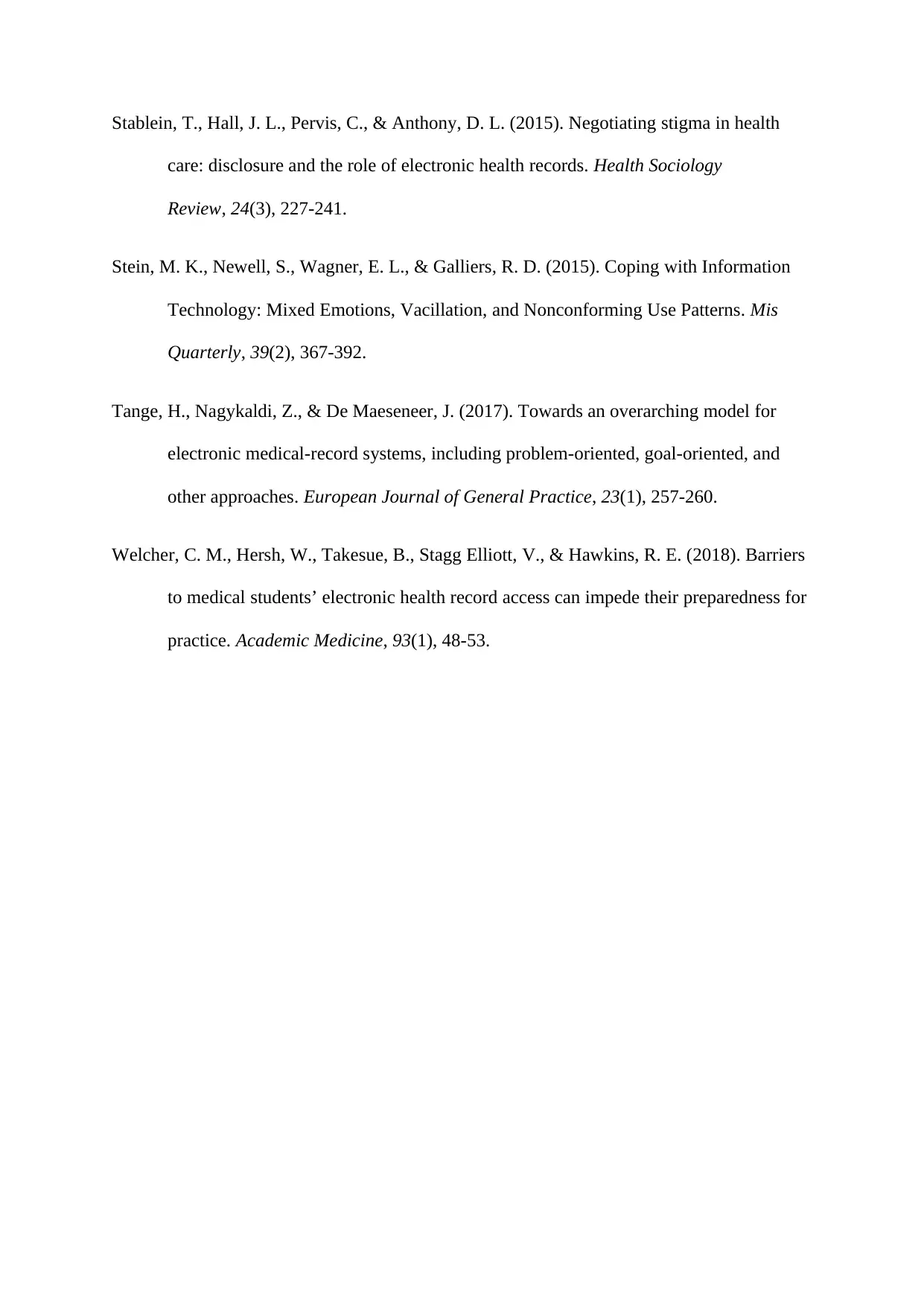
Stablein, T., Hall, J. L., Pervis, C., & Anthony, D. L. (2015). Negotiating stigma in health
care: disclosure and the role of electronic health records. Health Sociology
Review, 24(3), 227-241.
Stein, M. K., Newell, S., Wagner, E. L., & Galliers, R. D. (2015). Coping with Information
Technology: Mixed Emotions, Vacillation, and Nonconforming Use Patterns. Mis
Quarterly, 39(2), 367-392.
Tange, H., Nagykaldi, Z., & De Maeseneer, J. (2017). Towards an overarching model for
electronic medical-record systems, including problem-oriented, goal-oriented, and
other approaches. European Journal of General Practice, 23(1), 257-260.
Welcher, C. M., Hersh, W., Takesue, B., Stagg Elliott, V., & Hawkins, R. E. (2018). Barriers
to medical students’ electronic health record access can impede their preparedness for
practice. Academic Medicine, 93(1), 48-53.
care: disclosure and the role of electronic health records. Health Sociology
Review, 24(3), 227-241.
Stein, M. K., Newell, S., Wagner, E. L., & Galliers, R. D. (2015). Coping with Information
Technology: Mixed Emotions, Vacillation, and Nonconforming Use Patterns. Mis
Quarterly, 39(2), 367-392.
Tange, H., Nagykaldi, Z., & De Maeseneer, J. (2017). Towards an overarching model for
electronic medical-record systems, including problem-oriented, goal-oriented, and
other approaches. European Journal of General Practice, 23(1), 257-260.
Welcher, C. M., Hersh, W., Takesue, B., Stagg Elliott, V., & Hawkins, R. E. (2018). Barriers
to medical students’ electronic health record access can impede their preparedness for
practice. Academic Medicine, 93(1), 48-53.
1 out of 7
Related Documents
Your All-in-One AI-Powered Toolkit for Academic Success.
+13062052269
info@desklib.com
Available 24*7 on WhatsApp / Email
![[object Object]](/_next/static/media/star-bottom.7253800d.svg)
Unlock your academic potential
Copyright © 2020–2025 A2Z Services. All Rights Reserved. Developed and managed by ZUCOL.





